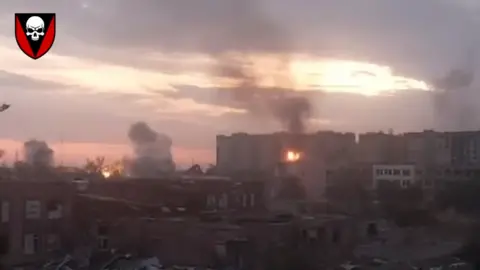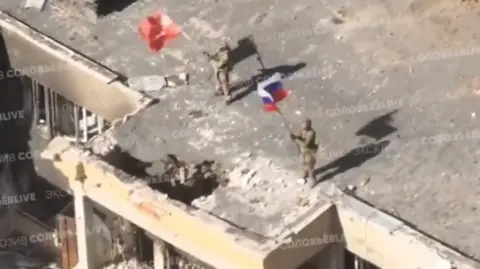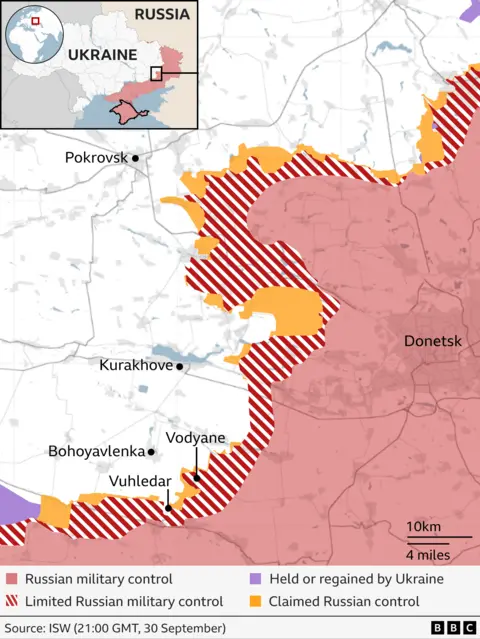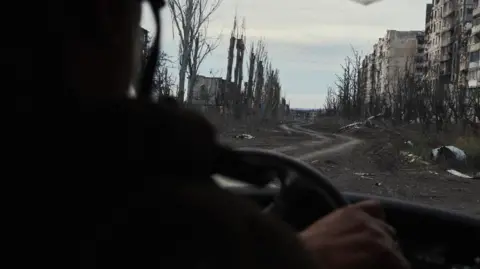 Ukrainian 72nd Brigade/Facebook
Ukrainian 72nd Brigade/FacebookRussian forces now have almost complete control of the eastern city of Vuhledar, which Ukrainian forces have defended since the start of Moscow’s full-scale invasion.
Analysts at DeepState, a prominent group that monitors the situation on the front lines in Ukraine, reported that Russian forces had taken the city, although this has not been officially confirmed.
For more than two years, Russia has been trying to capture the city to advance further north and reach regional transport hubs such as Kurakhove and Pokrovsk.
Pro-Kremlin military bloggers have now posted several videos showing Russian soldiers holding flags on the rooftops of several buildings in Vuhledar.
Donetsk regional authorities confirmed on Tuesday that Russian troops had almost reached the city center, while some reports said Ukrainian troops were still stationed in some areas.
 russian social media
russian social mediaThe BBC spoke to two 72nd Brigade soldiers who left the city before the final assault and took up new positions in the same area. They claim their troops have withdrawn from the city.
One machine gunner, who spoke on condition of anonymity, said it had been impossible to evacuate Ukrainian soldiers in the past few days, so they had to find a way out of Vuhledar on foot.
Many people were injured and killed by Russian drones and artillery fire as they tried to leave, said Roman, another soldier. Still more is missing.

Moscow has launched several attacks to take control of the city since the full-scale invasion began in February 2022, but all have so far failed. Last year one of the largest tank battles took place there.
Instead of launching a frontal attack, the Russians switched to their recently preferred tactic. That is, to advance along the flank and encircle the objective. Last month they captured the villages of Prechystivka in the west and Vodyane in the east to complete the pincer operation.
Moscow’s enormous advantage in weapons and troops (some soldiers estimate the ratio of its forces to be 7 to 1) allowed it to break through the Ukrainian defenses along its flanks and approach Vuhledar.
When the Russians effectively cut off the only remaining lifeline, the road from Vuhledar to Bohoyavlenka, it became clear that the city was doomed. The Russians advanced so close that artillery and kamikaze drones targeted everyone and everything that moved on those roads.
“We tried to send supplies and evacuate the wounded and dead, but we were not successful,” Roman said. “We lost a number of vehicles and (this work) had to be stopped.”
By Tuesday, about 100 civilians remained in Vuhledar out of its pre-war population of 14,000, according to Vadym Filashkin, head of the Donetsk region.
“Thank God, we have evacuated all the children. As for the 107 people who are still there, it is difficult to get them humanitarian aid, water and medicine because the war is still going on.”
 Ukrainian 72nd Brigade/Facebook
Ukrainian 72nd Brigade/FacebookThe situation became more serious as Russian troops entered the city, and Ukrainian forces began to retreat without waiting for orders to withdraw.
“If the withdrawal is not organized, it will be chaotic,” the machine gunner explained. Ukraine’s defenders were like titans trying to stop Russia, he said. But some groups were left completely disoriented by the communication disruption, he added. Their radios were down, and when under heavy fire they had to make quick decisions on their own, often forcing them to retreat.
Ukrainian defenses have been destroyed by Russian aerial bombs, thermobaric weapon systems such as Solntsepek heavy flamethrowers, drones and multiple rocket launchers.
Faced with such attacks, Roman argued, resigning from certain positions became inevitable. “You either die or retreat.”
But it was very dangerous to leave the almost besieged city. During the day, it became more of a suicide mission.
Ukrainian forces attempted to escape mainly at night, and were forced to cross minefields through designated routes to avoid roads due to close surveillance by Russian forces.
Until recently, evacuation vehicles could drive in the dark, even with their headlights off, Roman explained. But once the Russians reached the heart of the city, the only way to escape was on foot.
Those who successfully escape are exhausted and depressed. They are also angry at their commanders for not ordering a retreat earlier, as they claim it was clear that the Ukrainian army would not be able to hold the city for long.
said the machine gunner. “(I don’t know why they didn’t give the order)” “It could have been due to fear of the military leadership, or it could have been an order from the higher ups (to maintain our positions) with our blood until the end.”
Military officials from the 72nd Brigade and the Ukrainian operational command in the region declined the BBC’s request for comment.
In the most recent daily briefings, the military staff remained silent on Vuhledar.
Wednesday morning’s briefing made no mention of the situation in Bukhledar, saying only that “the enemy has launched an unsuccessful attack on our positions in the direction of Bohojavlenka.”

